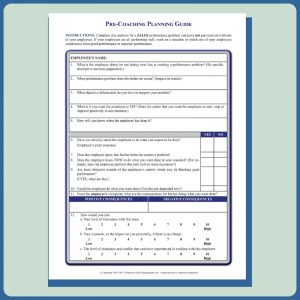
by James Schneider | Feb 27, 2019
Add Your Email Below to Download Our World-Class Pre-Coaching Planner… for FREE.
Today’s downloadable toolbox guide is the top guide for Coaching and Developing Sales Talent.
Banks and Credit Unions all around the country use Schneider Sales Management, Inc’s forms to work one-on-one with employees to set the goals that improve sales revenue, improve customer service, and improve employee performance.
Download the form above by entering your email address, or forward this page to a financial industry sales manager who you want to see improve quickly.
Preparation Will Focus Your Coaching
You can cut through to the real leverage point for improving an employee’s performance by asking yourself the few simple questions shown on the Pre-Coaching Planning Guide on the next page. This form puts an employee’s nonperformance in perspective so you can diagnose the real cause of the performance problem, and you can ask for the appropriate corrective action by an employee.
Understand Your Employees’ Behavior
Always ask yourself how often and how well an employee does what you want him/her to do. If an employee has never done what you want him/her to do, you probably have a training problem.
If he/she has done it before, but doesn’t do it consistently, or if he/she does it poorly, you probably have a motivation problem, or a coaching problem.
If you’re still not sure that you’ve identified the right performance problem, ask yourself if the employee could and would ever do it, even if his/her job depended on it. If your answer is no, you probably have a job fit problem, and more coaching isn’t the right solution.
Get Clarity on Specific Improvements
Finally, the most important step in all of your performance analysis is to define in one sentence, very specifically, what it is that you want the employee to do to improve his/her performance.
If you can’t do this, you haven’t yet identified the real performance problem, and you won’t be clear in telling the employee what action to take to improve.

by Mike Shallanberger | Dec 19, 2018
Will AI, in-branch, and self-help technology replace salespeople at banks and credit unions? The simple answer is NO according to a gathering of banking and tech thought leaders at the recent Future Branches conference in Austin, TX. But it will change how branch sales roles function, and add some key competencies required for salespeople.
While technology helps tremendously with understanding customer behavior, prospecting, and creating great customer journeys, there will always be a need for salespeople who can form and maintain relationships as a trusted advisor. No technology can build trust the way a great salesperson with keen emotional intelligence can. People are also needed to handle the sale of complex products, and to sell the benefits of new technology in order to drive adoption.
An article in the Harvard Business Journal suggests that, “Humans will need to focus on managing exceptions, tolerating ambiguity, using judgment, shaping the strategies and questions that machines will help enable and answer, and managing an increasingly complex web of relationships with employees and customers.”
For deeper conversations about how your bank or credit union hiring and sales practices may change as technology changes, sign up for the Schneider Report now.

by James Schneider | Nov 13, 2018
The Wells Fargo “quota-gate” incident has exposed as myth many of the financial industry’s long held beliefs about what makes a great sales organization. Even the best sales practices become unethical when they encourage greed rather than customer satisfaction.
The unethical sales practices at Wells Fargo come as no surprise to those of us who follow bank sales practices closely. Wells has been recording industry best cross-sell ratios while churning customers and employees for several decades through relentless product pushing. If you ask many bank or credit union executives about their sales culture, their first response is usually, “We don’t want to be a Wells Fargo.”
The knee-jerk reaction to this news may be to pull back from selling and setting sales goals altogether. That would be a mistake. The Hay Group has found that the nation’s most admired companies actually set more challenging goals for employees than other companies.
The good news is that it’s entirely possible to have strong sales proficiency with ethical sales behavior. Our philosophy has always been to focus on the customer, rather than on the products, to help your customers and to increase sales. Here’s a good place to start.
At Schneider Sales Management, every sales manager and employee in a sales or service role is held to a shared Selling Creed of Ethics. This shared system of values guides each decision made from the top down when it comes to hiring, training, coaching, and evaluating sales behavior.
Our Personal Selling Code of Ethics
We do whatever it takes inside or outside the formal boundaries of our solutions yet within the legal constraints of our business to help our customers with our selling so the value they receive far exceeds what they pay.
We treat every customer with respect so he/she feels important, comfortable and understood, even adapting our behavior as necessary to maximize our rapport and mutual trust.
We do what’s right for our customers and for our organization, even if that results in the loss of an immediate sale.
We do our homework, listen carefully as customers speak, and ask the right questions to fully understand a customer’s situation and objectives before recommending solutions.
We’re proactive in seeking information, in offering new insight into the impact of each customer’s current way of doing things, in making recommendations and referrals, and in urging customers to move forward with good ideas to help them improve their current personal or business situation.
We never use high pressure selling tactics as a substitute for coaching customers to their own decisions with questions.
We conduct selling with integrity and high ethics by not misleading customers, by complying with all legal and company requirements for selling, and by not overpromising what we can do for customers.
We give as much importance to what happens after a sale to assure customer satisfaction as we do to what happens during the sales process.
We commit ourselves to continuous, disciplined learning of the core competencies required for our selling role so we remain competent and trusted advisors to our customers.
We outwork our competitors and we work smart in allocating our sales time to our established priorities.
If your financial institution isn’t living up to these standards, it’s time to reexamine your sales process from the top down. Schneider Sales Management provides audits and shops as part of our consulting services. Call us today at (303) 221-4511 and get on track for a better 2019.





